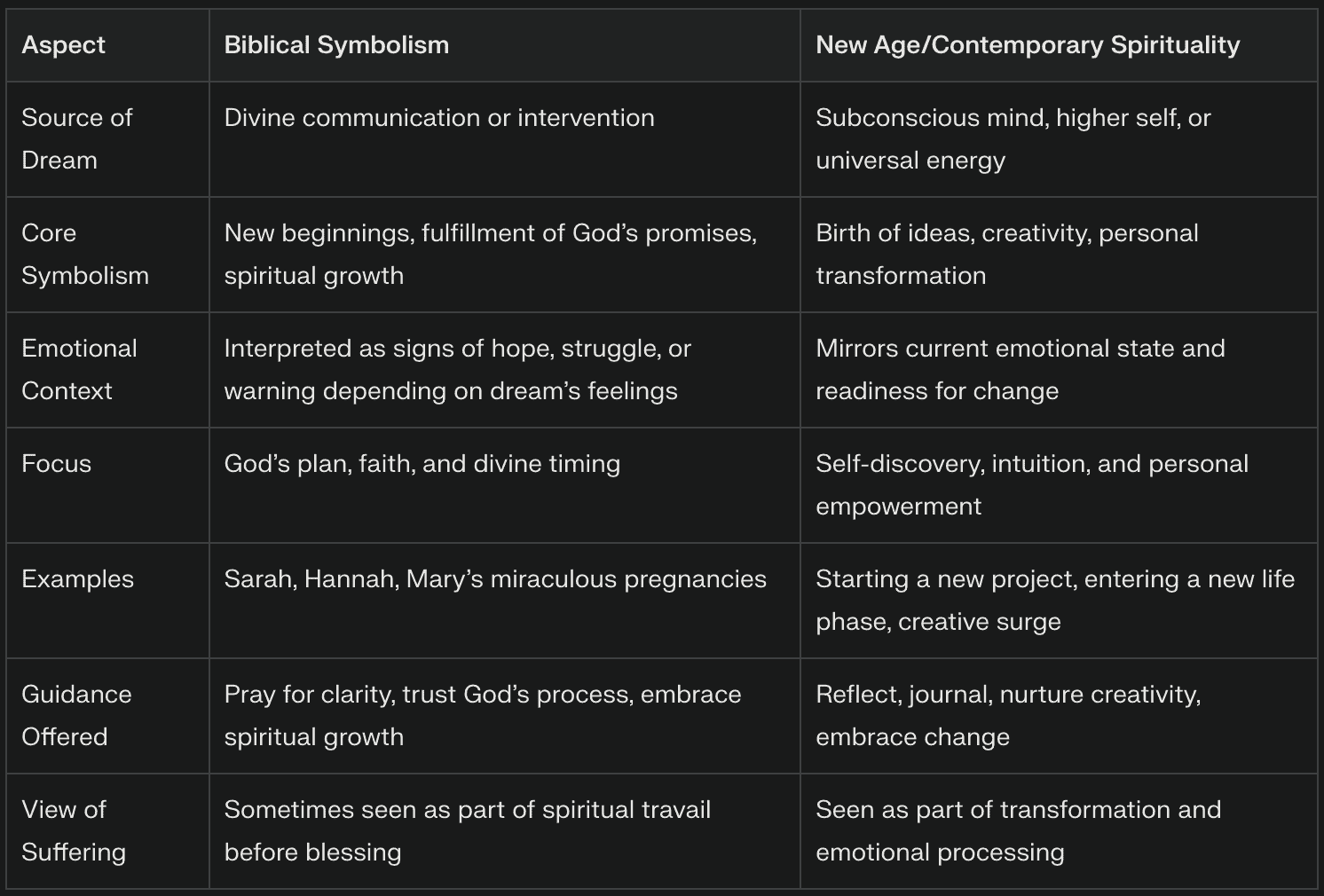Note: Many dream interpretations online rely on new age, mystical, or occult-based symbolism, which the Bible warns against (Deuteronomy 18:10–12). We must avoid interpreting dreams through numerology, astrology, or angelic codes not rooted in Scripture. The believer is called to test all things and hold fast to what is good (1 Thessalonians 5:21).
Biblical View of Dreams
Dreams occupy a significant place in the biblical narrative, often serving as a channel through which God reveals His plans and communicates with individuals. While the Bible presents numerous examples of dreams used by God, it also offers caution, not every dream is from Him. A biblically grounded view encourages both awe and discernment when considering the meaning of our dreams.
1. God Can Speak Through Dreams
Scripture shows that God sometimes uses dreams to give warnings, reveal truths, or guide His people. These dreams are not vague or mystical; they are purposeful, clear, and aligned with God's sovereign will.
- Joseph, son of Jacob
“Now Joseph had a dream, and he told it to his brothers; and they hated him even more.” (Genesis 37:5, NKJV)
Joseph’s dreams pointed to his future role of leadership and were later fulfilled when he became a ruler in Egypt. Though misunderstood at the time, these dreams were revelations from God that would unfold over time.
- Pharaoh’s Dreams and Joseph’s Interpretation
“Then it came to pass, at the end of two full years, that Pharaoh had a dream… Then Joseph said to Pharaoh, ‘God has shown Pharaoh what He is about to do.’” (Genesis 41:1, 28, NKJV)
These dreams foretold seven years of plenty followed by seven years of famine. God gave Joseph wisdom to interpret them, and Pharaoh acted upon that revelation to preserve Egypt and surrounding nations from disaster.
- Joseph, husband of Mary
“But while he thought about these things, behold, an angel of the Lord appeared to him in a dream…” (Matthew 1:20, NKJV)
Joseph was instructed in dreams multiple times to protect Mary and the child Jesus (see Matthew 1:20; 2:13, 19, 22). These dreams were God’s direct guidance in fulfilling messianic prophecy and preserving His redemptive plan.
2. Not All Dreams Are From God
While dreams can be used by God, Scripture is clear that not all dreams are divine. Some arise from the thoughts and emotions of daily life.
- Ecclesiastes 5:3 (NKJV)
“For a dream comes through much activity, and a fool’s voice is known by his many words.”
This verse suggests that dreams may simply result from the mind’s activity, concerns, labors, and preoccupations. They do not always hold spiritual significance.
- Jeremiah’s Warning About False Dreams
“I have heard what the prophets have said who prophesy lies in My name, saying, ‘I have dreamed, I have dreamed!’… Indeed they are prophets of the deceit of their own heart.” (Jeremiah 23:25–26, NKJV)
God strongly warns against false prophets who claim divine dreams when in fact they speak from their own imaginations. This reinforces that not every spiritual-sounding dream originates with God.
3. The New Testament Encourages Discernment
Even in the New Testament, where dreams and visions continue to appear, the focus is not on seeking dreams, but on testing everything against the truth of God’s Word.
- Acts 2:17 (NKJV)
“I will pour out of My Spirit on all flesh; your sons and your daughters shall prophesy, your young men shall see visions, your old men shall dream dreams.”
This prophecy, fulfilled at Pentecost, affirms that dreams may play a role in the Spirit-filled life. But even these experiences are subject to God's Word and must be tested.
- 1 Thessalonians 5:21 (NKJV)
“Test all things; hold fast what is good.”
Dreams must be evaluated in light of Scripture. If a dream contradicts God’s revealed truth, it must be rejected, no matter how vivid or emotionally powerful it seems.
- 2 Timothy 3:16–17 (NKJV)
“All Scripture is given by inspiration of God… that the man of God may be complete, thoroughly equipped for every good work.”
The Bible, not dreams, is our final authority and guide. Any message, whether from a dream or elsewhere, must align with the Word of God.
Get Closer to God Today
4.9
Average Rating
|Over 5 Million Downloads
Pregnancy in the Bible: Symbol of New Birth or Promise
Although the Bible does not mention anyone dreaming specifically of being pregnant, the imagery of pregnancy and childbirth is used extensively throughout Scripture to communicate profound spiritual truths. Pregnancy, in the biblical sense, is a symbol laden with expectation, growth, divine promise, and even suffering, all pointing to the unfolding of God's purposes in and through His people.
1. Pregnancy as a Symbol of Expectation and Redemption
In the Old Testament, pregnancy and labor often represent a state of longing or travail, particularly in the context of Israel’s hope for deliverance.
- Isaiah 26:17–18 (NKJV):
“As a woman with child is in pain and cries out in her pangs, when she draws near the time of her delivery, so have we been in Your sight, O LORD. We have been with child, we have been in pain; we have, as it were, brought forth wind; we have not accomplished any deliverance in the earth, nor have the inhabitants of the world fallen.”
In this prophetic lament, Isaiah compares Israel’s struggle for salvation to a woman in labor, emphasizing the deep yearning for redemption. The image of pregnancy here reflects unfulfilled hopes and the anguish of waiting on God to act.
2. Spiritual Pregnancy: Christ Formed in Us
The New Testament carries this symbolism forward, particularly in the context of spiritual formation and maturity.
- Galatians 4:19 (NKJV):
“My little children, for whom I labor in birth again until Christ is formed in you.”
The apostle Paul uses the metaphor of childbirth to describe his pastoral and apostolic labor for the believers in Galatia. Just as a mother endures travail to bring forth a child, Paul endures spiritual toil so that Christ may be fully developed in their hearts. This rich metaphor illustrates that spiritual growth is not passive, it requires nurturing, time, and sometimes spiritual struggle.
3. Mary: The Literal and Prophetic Fulfillment
Perhaps the most significant and literal example of pregnancy in the Bible is found in Mary, the mother of Jesus. Her miraculous conception was both a biological event and a theological sign, fulfilling centuries of prophecy.
- Luke 1:31 (NKJV):
“And behold, you will conceive in your womb and bring forth a Son, and shall call His name JESUS.”
- Luke 1:38 (NKJV):
“Then Mary said, ‘Behold the maidservant of the Lord! Let it be to me according to your word.’”
Mary’s pregnancy symbolizes the arrival of the Messiah, the embodiment of divine promise, and the culmination of hope. Her willingness to carry the Savior of the world is the ultimate example of human participation in God's redemptive plan. Her story reminds us that sometimes God's promises begin in hidden, private places - “wombs” of faith - before they are birthed into public fulfillment.
Dreaming of Being Pregnant: New Age Interpretations
New Age and modern spiritual perspectives tend to approach pregnancy dreams as reflections of the subconscious mind and catalysts for personal evolution. Here, dreams are seen as messages from the inner self or the universe, offering guidance for growth, healing, and creativity.
Key New Age Themes in Pregnancy Dreams:
- Birth of New Ideas: Pregnancy is a powerful metaphor for the incubation and emergence of new projects, relationships, or aspects of the self.
- Creativity and Potential: Such dreams often arise during periods of heightened creativity, signaling the development of new talents or the nurturing of innovative ideas.
- Transformation and Change: Pregnancy dreams can mark a transition or the beginning of a significant life phase, whether emotional, spiritual, or professional.
- Self-Reflection and Intuition: New Age interpretations encourage dreamers to look inward, using the dream as an invitation to explore their desires, fears, and aspirations.
- Connection to Feminine Energy: These dreams may also highlight the dreamer’s relationship with femininity, nurturing, and the divine feminine.
- Emotional Processing: Feelings experienced in the dream (excitement, anxiety, or uncertainty) are seen as mirrors of the dreamer’s waking emotional state and readiness for change.
Cultural and Personal Context: New Age approaches emphasize that the meaning of pregnancy dreams is deeply personal and shaped by individual experiences, beliefs, and cultural background.
 Final Thoughts
Final Thoughts
Dreams can be compelling, emotional, and sometimes even spiritually stirring. But as followers of Christ, we are not called to chase signs, symbols, or subconscious mysteries apart from God's truth. The Bible reveals that God has spoken through dreams in the past, but it also warns that not all dreams come from Him. We must distinguish between divine messages and human imagination, measuring everything against the unchanging standard of Scripture.
While New Age interpretations may offer creative or emotionally resonant explanations, often rooted in introspection, mysticism, or vague spirituality, the believer must remain rooted in God’s Word. True spiritual understanding does not come from inner voices, numerological codes, or symbolic dream guides, but from the Holy Spirit illuminating Scripture.
Whether a dream involves pregnancy or any other potent symbol, our response should always be one of prayerful discernment. Does it align with the character and truth of God as revealed in the Bible? Does it encourage righteousness, repentance, or obedience? Or does it merely flatter the ego or stir confusion?
In the end, our foundation is not found in dreams but in the living Word of God. As 2 Timothy 3:16–17 reminds us, Scripture equips us for every good work. Let us be people who seek God’s voice in His Word first and test all else, including our dreams, by that trustworthy standard.











